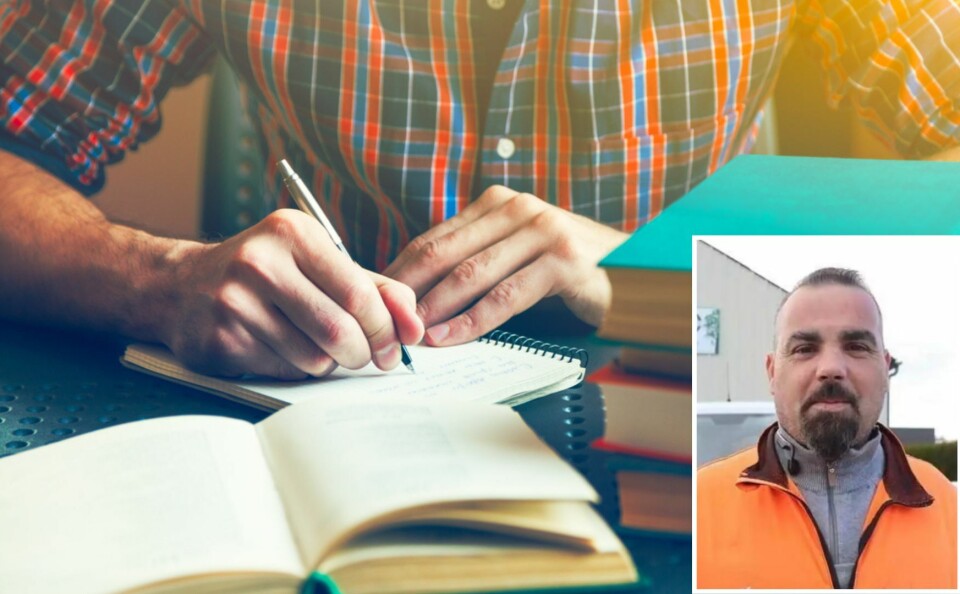-
'I helped restore French cathedrals as a female American stone cutter - despite prejudice'
Stella Cheng, who worked on the restoration of Notre-Dame Cathedral, faced sexism and racism
-
French woman named one of world’s best teachers
Céline Haller, inspired by English and US teaching methods, has gained recognition for revolutionising learning with hands-on projects and inclusivity
-
What does a maître cirier do in France?
Exploring an ancient craft form at a company founded 120 years ago
‘I am learning to read at 43 after running my own business for years’
A successful French entrepreneur tells us how he hid his illiteracy and why he decided to learn to read and write

I come from a family of what you would call ‘travellers’. We lived in a caravan and moved around from place to place.
We used to collect scrap wood or iron and then sell it on or make it into other objects for a profit. We would also sell our own crafts, such as wickerwork and various trinkets.
My stepfather used to make me stay in the caravan to look after my four younger brothers and sisters.
Teachers assumed we were troublemakers
Of course, we went to school from time to time, but we could not follow the curriculum because we were always moving around, so we tended to be left out. We did not socialise much, either.
Teachers often assumed we were troublemakers and treated us accordingly.
I did not have much of an education as we were so rarely in primary school – maybe only 10% of the time.
We never went at all after the age of 11. I suppose our parents assumed that we would do what they did, which suited them.
Read more: What help for 2.5 million people in France struggling with illiteracy?
I worked cash-in-hand but got into trouble when I had cancer
I never even tried to find a job with another firm. I could not read, I did not know how to behave correctly around other people.
I resented authority and I came from a social group that was not well-regarded by society.
My way to escape from my family was to get married at 18 and become a dad, as if I was already doomed to just follow in their footsteps.
In the beginning, I worked cash-in-hand (travailler au noir) but eventually I decided to become a tree specialist, pruning trees.
I initially had some trouble with administration, particularly during a four-year period when I had cancer.
I was severely penalised and incurred more than €150,000 in administrative costs.
Read more: Is it legal to pay a tradesperson in cash in France?
You learn tricks to hide illiteracy
After that, I set up my business as a micro-entreprise, which is a much simpler system for an independent worker, and more practical for me.
It was certainly not easy running a business without being able to read and write, but I simply learned to hide the fact that I was illiterate.
Sometimes I would look at something and apologise, saying that I had forgotten my glasses, and would take the document away with me.
With customers, I might deliberately keep my hands dirty so I could ask them to fill in the document themselves – you learn all sorts of tricks to get around it.
My children have now grown up and they work with me.
They were my motivation to learn to read and write and communicate digitally.
These days, communication is what running a business is all about, whether in terms of keeping in contact, administration or sales. It is absolutely vital to learn these skills.
Read more: What are the options for employing a gardener in France?
I inspired event organiser to set up literacy lessons
In April 2022, I went to a weekend event called ‘Vis l’Âge Bleu’ in Château-Gontier (Mayenne), dedicated to a range of issues around the topic of how to age well.
Here I met the event’s organiser, Stéphane Vrignon, and we became friends.
He was touched by my story and decided to create an association, My Facstory, which reaches out to others in similar situations.
The association has two key components. The first focuses on literacy lessons, while the second is all about welcoming and supporting individuals who are not French and who are looking to learn the language. Those lessons are provided by another volunteer teacher.
We are all ages and backgrounds. One of the youngest is a 24-year-old woman who has had difficulties reading and writing since childhood.
She was registered as disabled and was integrated into support structures for disabled people, which did not help with literacy.
Nevertheless, she trained as a gardener and hopes her literacy lessons will allow her to earn a real salary.
She also wants to get a driving licence so she does not have to be accompanied on trips all the time, which will give more social freedom.
Related articles
16 things you can do at your library in France apart from borrow books
Insurance clarified for self-employed workers in France
Career change: ‘What I learned at 54 working in a French vineyard’
























